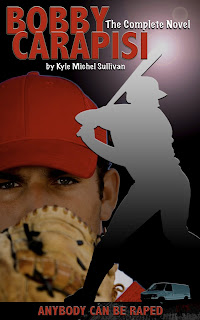I've asked a man who's worked on a number of films and headed the writers' group I once belonged to if he'll read "The Alice '65" and give me some feedback. I didn't always agree with what he said in the group, but I usually understood where he was coming from. If he agrees to do it, I'll also get some insight into how much of Hollywood will see the script...and then can decide how far I want to go with fitting their mold.
Right now I'm trying to decide what sort of voice would work best for the book version -- first or third person. First person would mean telling the story completely from Adam's perspective, so we'd learn a hell of a lot about him. But that restricts knowledge of Casey to what she's willing to share or he's able to discern. Don't like that; she's just as important to the story as he is.
Of course, "Huckleberry Finn" was written in first person and Mark Twain got a lot more into it than just Huck's viewpoint. So were most of Raymond Chandler's works, and his characters are as vivid as anything. That's a wide disparity in genres but...
Problem with third person is...well...to me, it becomes a bit impersonal...and I haven't really written in that voice. One that's omniscient (though Ace comes close, in LD). I know I wouldn't want to fall into the style Thornton Wilder used, where each person's life history is explained in very nice prose; I preferred the moments where people spoke to each other in "The Bridge of San Luis Rey".
However, third person is how Tolstoy wrote both "Anna Karenina" and "War and Peace" and both were glorious books. And I've already done a book that has three first person voices in it -- "Bobby Carapisi" -- and one that used a fictional character to tell the story, so I think I've gone as far as I can in that. Maybe it's time to see just how close I can get to the characters in third person.
Henry James had a knack for it. Maybe I should reread "Washington Square", my favorite of his books. William Wyler made it into an amazingly deep film, "The Heiress", thanks in no small part to to great performances by Olivia de Havilland, Miriam Hopkins and Ralph Richardson. Montgomery Clift was good but a bit too modern in his style of acting. But I can't think of another actor of the time who would have been right. But James had this way of stuffing in the psychology less through telling and more by action...if I remember right.
Of course, he was also a bit arch...but I can be too, so...
Right now I'm trying to decide what sort of voice would work best for the book version -- first or third person. First person would mean telling the story completely from Adam's perspective, so we'd learn a hell of a lot about him. But that restricts knowledge of Casey to what she's willing to share or he's able to discern. Don't like that; she's just as important to the story as he is.
Of course, "Huckleberry Finn" was written in first person and Mark Twain got a lot more into it than just Huck's viewpoint. So were most of Raymond Chandler's works, and his characters are as vivid as anything. That's a wide disparity in genres but...
Problem with third person is...well...to me, it becomes a bit impersonal...and I haven't really written in that voice. One that's omniscient (though Ace comes close, in LD). I know I wouldn't want to fall into the style Thornton Wilder used, where each person's life history is explained in very nice prose; I preferred the moments where people spoke to each other in "The Bridge of San Luis Rey".
However, third person is how Tolstoy wrote both "Anna Karenina" and "War and Peace" and both were glorious books. And I've already done a book that has three first person voices in it -- "Bobby Carapisi" -- and one that used a fictional character to tell the story, so I think I've gone as far as I can in that. Maybe it's time to see just how close I can get to the characters in third person.
Henry James had a knack for it. Maybe I should reread "Washington Square", my favorite of his books. William Wyler made it into an amazingly deep film, "The Heiress", thanks in no small part to to great performances by Olivia de Havilland, Miriam Hopkins and Ralph Richardson. Montgomery Clift was good but a bit too modern in his style of acting. But I can't think of another actor of the time who would have been right. But James had this way of stuffing in the psychology less through telling and more by action...if I remember right.
Of course, he was also a bit arch...but I can be too, so...






















